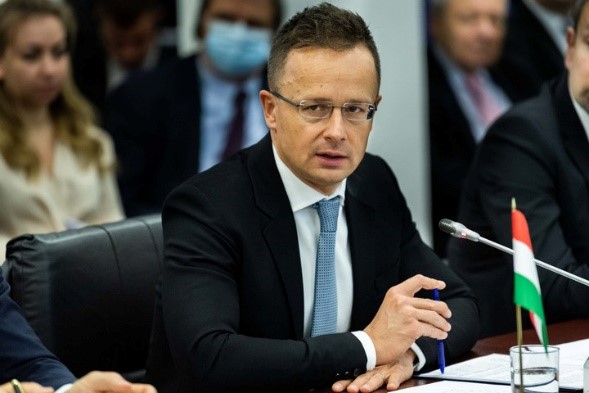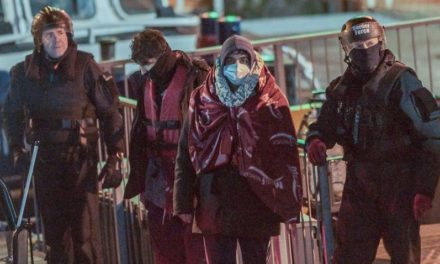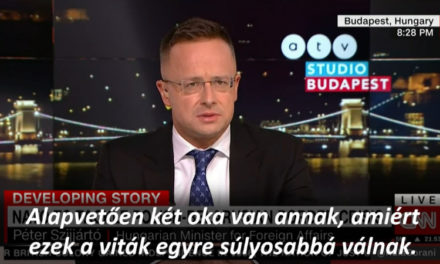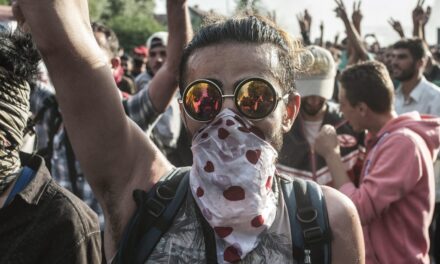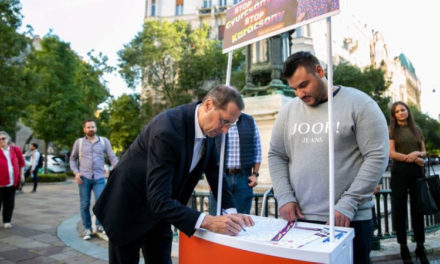Minister of Foreign Affairs and Trade Péter Szijjártó gave an interview to CNN on Christiane Amanpour's program, the transcript of which was prepared by the Ministry of Foreign Affairs and Trade and published by Magyar Hírlap.
Reporter: Russia's war budget depends heavily on energy. However, the country is currently facing an unprecedented ban on oil imports imposed by the European Union, with a few exceptions, of which Hungary is one. Under the leadership of Prime Minister Viktor Orbán, Hungary has declared itself an illiberal democracy that often clashes with its Western allies and maintains good relations with Vladimir Putin. Now the country, which opposes further energy sanctions against Moscow, is reportedly moving ahead with plans to expand a new nuclear power plant with the Russian government. Foreign Minister Péter Szijjártó joins me here in the studio. We will soon return to this topic as well, but first, since he is observing the events as the foreign minister of a neighboring country. What do you think it means from a strategic point of view that after almost five months, Russia will consolidate its conquests in the East and perhaps acquire more and more territory? How do you think the war will end?
Péter Szijjártó: I represent a country neighboring Ukraine. And our assessment of the situation is that every minute spent at war in Ukraine represents a security risk for Hungary. Because if there is a war going on in the neighborhood at any time, it is also a security threat. So if there is any country that is 100 percent interested in the war ending as soon as possible and peace returning to our region as soon as possible, it is us. So all we can do is hope and pray that peace will come soon, otherwise Europe will face extraordinary challenges, and for us next door, being so close to war, the situation is even more dangerous.
R.: Could you put it more clearly? Who are you under threat from? Do they feel threatened by Russia or Ukraine? Who is the aggressor in the current situation?
Sz. P.: There is a war going on in the neighboring country. The situation is clear. We have condemned this war from the beginning. We have condemned the military aggression against Ukraine from the beginning. We stand for the territorial integrity and sovereignty of Ukraine. We are also faced with the direct effects of the war, first of all the refugee crisis. Until now, Hungary has accepted 830,000 refugees, 830,000. And that number is growing very quickly. So if you ask me how quickly this can all end, I would say that if I look at the numbers, the daily increase in the number of refugees coming to us, I don't think it will end anytime soon, because if there was any hope that it would end soon, then the number of refugees would decrease, but unfortunately this is not the case.
R.: Let's talk about Putin's ability to continue this war. A lot depends on money and your economy and your ability to finance it all. There is a big difference in how many European countries feel: you said they are close to the border. This is true, as they are on the border. On the eastern side of the border. To the west is Poland, also on the border. The positions of the two countries are extremely different in terms of what needs to be done. Both lived under the domination of the Soviet Union, both understand that situation. However, they handle the situation differently. Let me read a quote from a Polish official. Because, perhaps it would be polite to say that they are trying to thread a very thin needle. After all, they continue to buy Russian oil and are exempt from Russian oil import sanctions, which, in our understanding, provides Putin with roughly $800 million a day for his war budget…
Sz. P.: Not us, no no, it's not us, it's not Hungary, we're just a very small part of it.
R.: But they are part of it. According to the Financial Times, a Polish official told reporters at an EU summit the other day about your exemption that "I don't understand the logic of profiting from war, the logic of profiting from blood and sacrifice." And you recently said that the fact that Hungary buys Russian energy is, I quote, "not a political statement". But how do you reconcile those two things and how do you reconcile that they actually contribute to Putin being able to continue this war?
Sz. P.: We do not agree.
R.: Why does he say that, since every dollar that reaches him he uses to buy weapons and ammunition and to maintain the war.
Sz. P.: First of all, our share of the European purchase of Russian fossil fuel is very small. On the other hand, energy supply is a physical issue. It is not a philosophical, political, or ideological question, but a physical one. We asked for an exemption from the oil embargo, because if we had not asked, if we had not received it, it would be physically impossible to supply the country with enough oil. It's just a matter of math: we need a certain amount of oil to run the country. If the Russian shipments cease, there is no physical possibility to replace them. I'll tell you why, not for fun and not out of a voluntary choice, but geography determined our house number. Geography determined the infrastructure. To change the giant east-west transport routes to north-south transport routes in Central Europe will take a few years. A lot of money, but what is even more important in this case, a few years, even 5-6-7 years. So, since it is a physical issue, the question is whether Russian oil or Russian gas can be substituted for us to be able to run our own country. Currently, our answer to that is no, and the answer is not because we don't want to, but because it is physically impossible. And one thing, in my opinion, we cannot allow: making the Hungarian people pay the price of the war. Because it is not the responsibility of the Hungarian people that the war broke out, we did not want this war, we do not want this war, but we cannot solve it tomorrow or next year to replace the Russian energy supply with anything else.
R.: Everyone is obviously facing the same situation: huge energy prices, huge inflation, lack of food security, but let's take your word for it, and indeed, the European Union has granted you exemptions on some issues...
Sz. P.: As well as for other countries, let's not forget this.
R.: It is so, for some other countries as well. However, you have gone one step further. They said that no sanctions should be applied to Patriarch Kirill. He is the patriarch of the Russian Orthodox Church who supports Putin and the soldiers who kill innocent Ukrainians. You just said that Russia is the aggressor. He also decided to break with his European and American colleagues and not to send weapons to Russia. This, as you are probably well aware, is what President Zelenskiy sent a very clear and direct message to your Prime Minister, Viktor Orbán, back in March. Listen to what he had to say.
"I was there on the bank, I saw the monument, the shoes on the Danube bank, which commemorates the mass murder. I was there with my family. Listen Viktor! Do you know what's going on in Mariupol? Please, if you can, go to the Danube bank and look at those shoes! And you will see that mass murders can happen again.”
R.: So you're talking about a monument and saying "look, now we're in trouble, why don't you make more of an effort?" – of course, I thought earlier that weapons could be sent to Ukraine, not to Russia. But how does one respond to such a moral challenge?
Sz. P.: This is a very unfair statement, on the one hand, because...
R.: Why do you say that?
Sz. P.: Because we are currently providing the largest humanitarian aid in the history of our country. I already said: we accepted 830,000 refugees from Ukraine. We take care of them. Another 13-15 thousand will arrive tomorrow, because this is the current trend. We accept them too. We take care of everyone who wants to stay with us for a longer period of time, we offer them a job, and we provide school and kindergarten education for the children. And we don't expect anyone to thank the Hungarian people for tens of thousands of them joining together and working every day to provide for the hundreds of thousands of Ukrainians who come to us - we don't expect that. But we expect one thing: that they do not provoke us, do not accuse us, and do not say bad things about us just because we made a decision. And this decision is nothing more than not participating in the arms transport. Why? Because we are a neighboring country, and the main objective for us is not to get involved in this war in any way. And you know…
R.: Who would you like to win?
Sz. P.: Of course the victim should win, that's not a question.
R.: But the victim needs help.
Sz. P.: Yes, and we also help him in the following way. Since we decided not to transport weapons, the Hungarian-Ukrainian border provides the safest way for anyone to cross the Ukrainian border to the west from their point of view. That is why the International Red Cross operates its logistics center from Hungary in order to organize its activities in Ukraine. Why? Because this is a secure border, and if at any time humanitarian aid shipments cross it, everyone can be sure that they are not weapons, so these shipments will not be in danger. Secondly - if you don't mind, I would like to say one more sentence - I am not sure that everyone knows that 150,000 Hungarians live in the western part of Ukraine. It's clear that if we were to ship weapons, then those weapons shipments would be targeted by the Russians, right? We do not want the Russians to shoot at an area where Hungarians live, because, I say again, we do not want to get involved in this conflict. So we have to take into account the security of Hungary and the Hungarian people.
The full interview can be read here.
Image: Facebook

